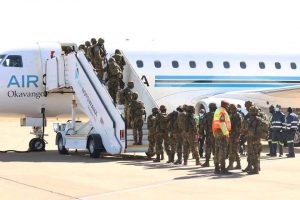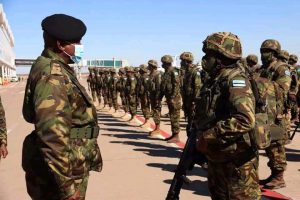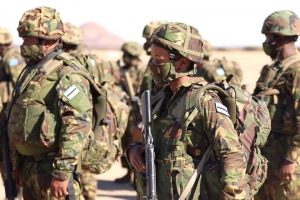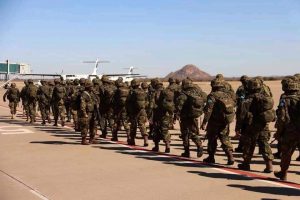The Botswana Defence Force (BDF) today officially deploying troops to Mozambique to take part in the Southern African Development Community (SADC) Standby Force mission there.
Botswana’s President Masisi saw off the troops at the Sir Seretse Khama International Airport north of Gaborone on Monday morning as Commander-in-Chief of the Botswana Armed Forces and Current Chairperson of the SADC Organ on Politics, Defence & Security.
“Complex as the security situation in the SADC region maybe, as in the past, Botswana’s foreign policy goals have been and remain very clear. Botswana’s security cannot be attained without that of her neighbors,” he said.
“Today we witness yet another milestone in our set out objectives of propelling the peace agenda to our region in following through on the SADC Mandate aimed at facilitating the peaceful conditions in the northern part of the Republic of Mozambique.
“It is for this reason that I am here this morning to address members of the Botswana Defence Force who as part of the SADC Standby Force will be deployed to provide regional support to the Republic of Mozambique to combat the looming threat of terrorism and acts of violent extremism in the Cabo Delgado region in the northern part of that country, as an element of the SADC Mission in Mozambique (SAMIM).”
Troops are being deployed via Air Botswana aircraft, and appear to follow on from a pre-deployment team that arrived in Mozambique last week. Photos showed Botswana Defence Force C-130 Hercules aircraft offloading troops and light vehicles at Pemba last week and over the weekend.
Botswana’s Minister of Defence, Justice, and Security, Kagiso Mmusi, said a total of 296 soldiers will today leave for Mozambique to join the SADC standby force.
It is believed that Tanzania and Angola may also take part in the Standby Force deployment.
In a statement, the Office of the President of Botswana said “The BDF contingent will work intently with the Forcas Armadas de Defesa de Mocambique (FADM) and other forces from the Southern Africa Development Community to include countries that have bilateral agreements with the Republic of Mozambique in designated sectors of responsibility within the Cabo Delgado region.”
The mention of bilateral agreements refers to Rwanda, which has 1 000 troops in Mozambique. Soldiers from Rwanda, which is not a member of the SADC, would fight alongside Mozambique’s forces and SADC troops, the Rwandan government said on 9 July when the deployment began.
Rwandan troops appear to have started patrols in at least the Nangade district of Cabo Delgado as well as near Afungi, the site of a natural gas processing plant.
It has been reported that late last week Rwandan and Mozambican forces launched offensives around Mocímboa da Praia.
South African special forces, meanwhile, appear to have arrived in Mozambique last Monday, with photos showing a South African Air Force (SAAF) C-130BZ Hercules (406) unloading soldiers and Hornet vehicles (the Hornet is used by South Africa’s Special Forces).
Military sources told the Daily Maverick last week that leading elements of the SADC standby force, including its South African commander, were in Mozambique.
The Deployment Commander is believed to be Major General Xolani Mankayi, who served as Commander of the SANDF Peace Mission to Burundi.
The advance team is not expected to be immediately involved in direct combat operations against al-Sunna insurgents.
Their main mission is to gather intelligence, conduct reconnaissance, advise the Mozambican military, and prepare command and control structures for a potential deployment of a full SADC brigade.
The timing and size of the SADC deployment, as well as the number of soldiers sent by each member, is not yet known.
According to the opposition Democratic Alliance party, South Africa has 1 500 troops in Mozambique but this has not been confirmed.
Parliament has not yet been informed about the South African National Defence Force deployment to Mozambique.
Mozambican President Filipe Nyusi said on Sunday that troops fighting the Islamic State-linked insurgency in its northern province of Cabo Delgado were gaining ground and the enemy was retreating.
Nyusi was addressing the nation on the crisis that was triggered when the insurgents in March attacked the coastal town of Palma, near natural gas projects worth $60 billion that is meant to transform Mozambique’s economy.
The insurgency has caused total paralysis in mineral activity, agriculture, and infrastructure development in the region, he said.
“We should not fear the presence of foreign forces in our country,” he said. “We should be afraid of being alone in fighting terrorism.”
“Rwandan troops have come to save lives in a province where we have people being killed and beheaded every day,” the president said. “We couldn’t deny any available assistance.”







.jpeg&w=60&q=100&h=60)










